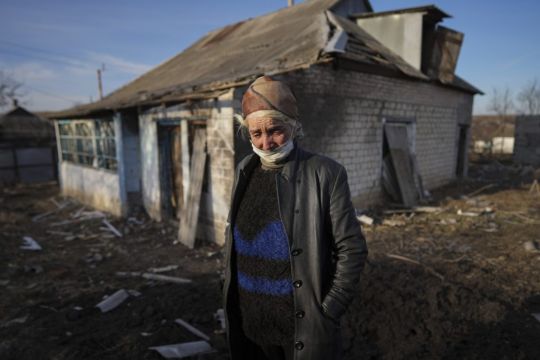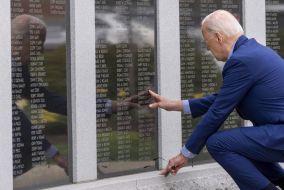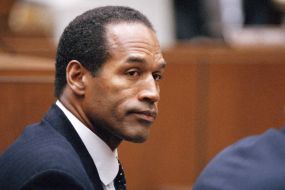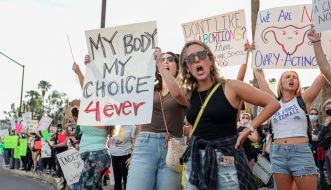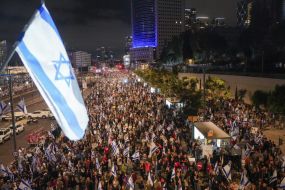Western leaders said Russian troops have moved into rebel-held areas in eastern Ukraine after President Vladimir Putin recognised their independence – but some indicated it was not yet the long-feared fully fledged invasion as confusion reigned in the region.
For weeks, Western powers have been bracing for an invasion as Russia massed an estimated 150,000 troops on three sides of neighbouring Ukraine.
They warned an attack would cause massive casualties, energy shortages in Europe and economic chaos around the globe – and promised swift and severe sanctions if it materialised.
They have also warned Moscow would look for cover to invade – and just such a pretext appeared to come on Monday, when Mr Putin recognised as independent two separatist regions in eastern Ukraine, where government troops have long fought Russia-backed rebels.
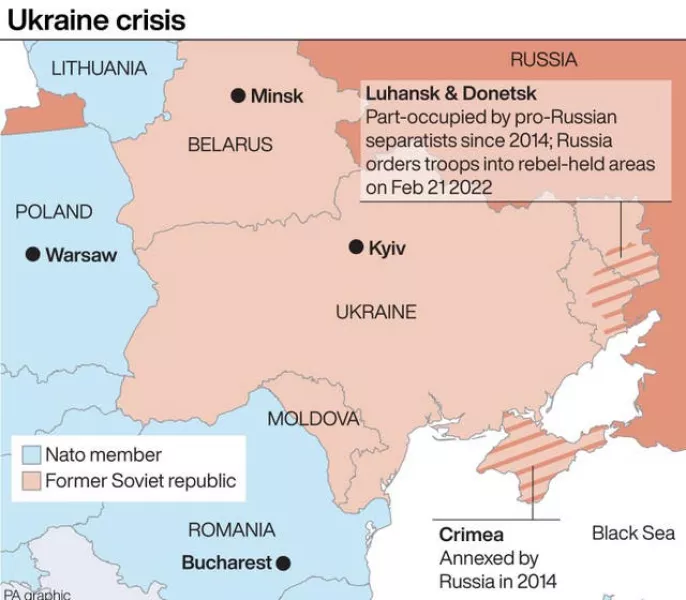
The Kremlin then raised the stakes further on Tuesday, by saying that recognition extends even to parts held by Ukrainian forces.
Kremlin spokesman Dmitri Peskov said Russia has recognised the rebel regions’ independence “in borders that existed when they proclaimed” their independence in 2014 – broad territories that extend far beyond the areas now under rebel control and that include the major Black Sea port of Mariupol.
Ukrainian forces later reclaimed control of a large part of both regions early in the nearly eight-year separatist conflict that has killed more than 14,000 people.
The recognition move opened the door for Mr Putin to formalise his hold on the regions and send forces in, though Ukraine and its Western allies have long claimed Russian troops have been fighting there for years.
Moscow has denied those allegations.
Condemnation of Russia’s moves from around the world was quick.
Ukrainian President Volodymyr Zelenskyy said he would consider breaking diplomatic ties with Russia and Kyiv recalled its ambassador in Moscow.
But confusion over what exactly was happening on the border threatened to hobble a Western response.

“Russian troops have entered in Donbas,” the name for the area where the two separatist regions are located, EU foreign policy chief Josep Borrell said in Paris on Tuesday.
“We consider Donbas part of Ukraine.”
But in a distinction that is sure to complicate a European and Western response, he added: “I wouldn’t say that (it is) a fully fledged invasion, but Russian troops are on Ukrainian soil.”
Poland’s Defence Ministry and British Health Secretary Sajid Javid also said Russian forces had entered Ukraine’s east, with Mr Javid telling Sky News that “the invasion of Ukraine has begun”.
The Kremlin has not confirmed any troop deployments to the rebel east, saying it will depend on the security situation.
Vladislav Brig, a member of the separatist local council in Donetsk, told reporters that the Russian troops had already moved in, but more senior rebel leaders did not confirm that.
Late on Monday, convoys of armoured vehicles were seen rolling across the separatist-controlled territories.
It was not immediately clear if they were Russian.
In response to the moves thus far, top EU officials said the bloc was prepared to impose sanctions on several Russian officials and banks financing the Russian armed forces and move to limit Moscow’s access to EU capital and financial markets.
EU foreign ministers are meeting later to discuss the measures – but they did not appear to include the massive punishment repeatedly promised in case of a fully fledged invasion.
Prime Minister Boris Johnson also said the UK would slap sanctions on five Russian banks and three wealthy individuals.
While he said that Russian tanks have already rolled into eastern Ukraine, he warned a full-scale offensive would bring “further powerful sanctions”.
The White House has also moved to respond, issuing an executive order to prohibit US investment and trade in the separatist regions, and additional measures – probably sanctions – were to be announced on Tuesday.
Those sanctions are independent of what Washington has prepared in the event of a Russian invasion, according to a senior administration official.
The Russian moves also pushed Germany to suspend the certification process for the Nord Stream 2 pipeline that was to bring natural gas from Russia.
The pipeline was built to help Germany meet its energy needs, particularly as it switches off its last three nuclear power plants and phases out the use of coal, and it has resisted calls by the US and others to halt the project.

As world leaders scrambled to decide on their response, legislation that is likely to set the stage for a deeper move into Ukrainian territory moved through Russia’s parliament.
The Bills, which sailed quickly through the Kremlin-controlled parliament, envisage military ties between Moscow and the separatist regions, including possible deployment of Russian military bases in the separatist regions.
Even as alarm spread across the globe, Mr Zelenskyy sought to project calm, telling Ukraine in an address overnight: “We are not afraid of anyone or anything. We don’t owe anyone anything. And we won’t give anything to anyone.”
His foreign minister Dmytro Kuleba will be in Washington on Tuesday to meet US secretary of state Antony Blinken, the State Department said.
Chinese Foreign Ministry spokesperson Wang Wenbin on Tuesday said China would “continue to stay in engagement with all parties”, continuing to steer clear from committing to back Russia despite the close ties between Moscow and Beijing.

Russia has long denied it has any plans to invade Ukraine, instead blaming the US and its allies for the current crisis and describing Ukraine’s bid to join Nato as an existential challenge to Russia.
Mr Putin reiterated those accusations in an hour-long televised speech on Monday, when he announced that Russia would recognise the rebels.
“Ukraine’s membership in Nato poses a direct threat to Russia’s security,” he said.
Russia says it wants Western guarantees that Nato will not allow Ukraine and other former Soviet countries to join as members.
Moscow has also demanded the alliance halt weapons deployments to Ukraine and roll back its forces from eastern Europe – demands flatly rejected by the West.
Mr Putin warned on Monday that the Western rejection of Moscow’s demands gives Russia the right to take other steps to protect its security.
Sweeping through more than a century of history, Mr Putin painted today’s Ukraine as a modern construct used by the West to contain Russia despite the neighbours’ inextricable links.
In a stark warning to Ukraine, the Russian leader claimed that it has unfairly inherited Russia’s historic land granted to it by the Communist rulers of the Soviet Union and mocked its effort to shed the Communist past in a so-called “decommunisation” campaign.
“We are ready to show you what the real decommunisation would mean for Ukraine,” Mr Putin added ominously in an apparent signal of his readiness to raise new land claims.
Amid the soaring tensions, US President Joe Biden and Mr Putin tentatively agreed to a meeting in a last-ditch effort to avoid war.
But the US always said that if Russia moved in, the meeting would be off.
